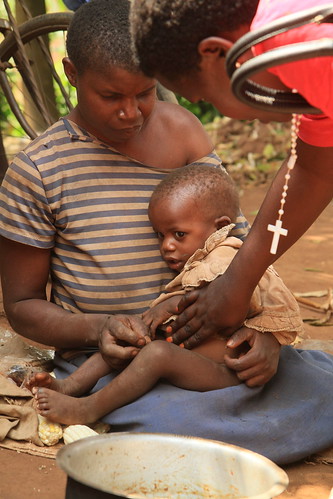Built for Africa
Three male teachers surround us in the school yard, just as thirsty for information as the kids they teach at the primary school.
“Why don’t you drink our water? Is it not as clear as yours?
Yes, it looks clear, but there are microscopic things you can’t see in it that causes illness, we explain. Why don’t they know this already when their kids are missing school — or dying — because of water-born illnesses and who knows what else?
“Look. We’re strong and healthy, and we drink the water,” they tell us.
The people here that survive childhood are no doubt strong. We have been using the phrase “Built for Africa” to refer to people or objects that can withstand the harsh conditions in their world.
After mass on Sunday, we saw just how bad things can be when we visited a handful of homes in the parish. At one home, we met a mentally ill woman and her alcoholic husband struggling to raise four kids — all of them were sick with “fever.” Around here, fever kills, because people suffer without medical care and medicine since they can’t afford to pay for it.
Two of the children lay on a mat on the ground outside a mud-and-reed-constructed, one-room structure. The younger of the two — just a baby — wimpered and struggled to breathe. The older child lying next to the baby watched us, but couldn’t move at all. It was heartbreaking.
We visited many homes and time and time again, we were introduced to families and told how many children the mother had, then how many of them had died.
Drink Local Drink Tap may not be able to save every child, but with the partners we have here and at home, we can give these people access to clean, safe drinking water. If it saves one child, it will have been worth it.


Write a Reply or Comment